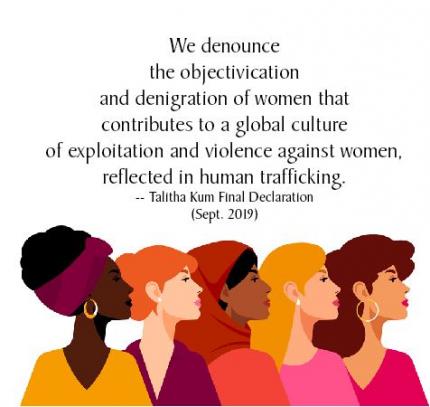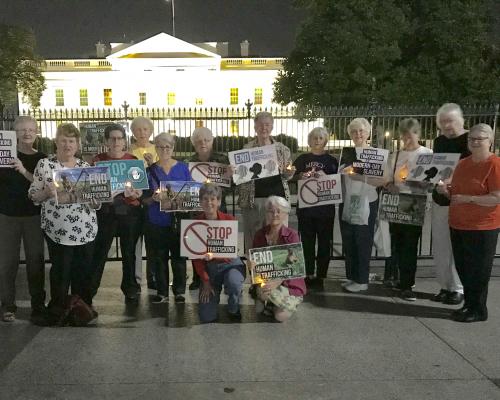The members of LCWR commit to collaborate in order to abolish human trafficking, a form of modern-day slavery.
 Human trafficking is a horrendous violation of the inherent worth and basic dignity of the individual. It has been condemned in the strongest possible terms by people of faith and the United Nations community.
Human trafficking is a horrendous violation of the inherent worth and basic dignity of the individual. It has been condemned in the strongest possible terms by people of faith and the United Nations community.
There are millions of victims of human trafficking around the world. They are boys and girls, men and women, exploited for labor, commercial sex and their own organs. It is difficult to assess the real size and scope of human trafficking because the crime takes place underground. The International Labor Organization estimates that any given time more than 40 million people are trapped in some form of slavery, including 25 million in forced labor and 15.4 million in forced marriage. We know that 1 in 4 victims are children and that women and girls are disproportionately affected, accounting for 99% of victims in the commercial sex industry, and 58% in other sectors.
Religious women have been involved in anti-trafficking work for decades. Many religious are ministering in both direct service to survivors and education and advocacy efforts to stop human trafficking. Religious women staff safe-houses and provide education, job-training, and transitional skills to survivors. Catholic sisters are well-respected for the educational programs they provide to first-responders including hospital staff, hotel personnel, law-enforcement officers, classroom teachers, and the general public.
LCWR and U.S. Catholic Sisters Against Human Trafficking, with our partners in the international anti-trafficking network of Talitha Kum, pledge to address the root causes of human trafficking. We denounce the objectification and denigration of women and girls that contributes to a global culture of exploitation and violence that fuels human trafficking. We denounce the neoliberal economic model that prioritizes profits over human rights and environmental sustainability, creates a culture of violence and commodification, exploiting the planet and denying funds for basic human needs, putting people at risk of being trafficked. We denounce unjust immigration policies rooted in a culture of racism and xenophobia which deny the basic human rights of people on the move and make them vulnerable to human traffickers.
We call on all people to ensure that:
- Governments enact laws that promote and protect the dignity and rights of women and girls and we commit ourselves to stand in solidarity with them and to promote the dignity and equality of all people;
- Governments adopt economic policies that prioritize the well-being of people and our planet home by protecting workers and strengthening oversight of labor recruiters; requiring corporations to report on how they are addressing human trafficking in their supply chains; increasing funds for survivor services; and caring for our common home and we commit ourselves to just and sustainable economic practices;
- Governments to implement migration policies that prevent human trafficking and protect the safety, dignity, human rights, and fundamental freedoms of all people regardless of their migratory status and we pledge to work across borders to ensure the right of all to safely migrate and to advocate for just immigration policies.
We know that only by working in solidarity will we be able to confront the structural injustices that perpetuate human trafficking. Together, we will create a future filled with prophetic hope.
LCWR has spoken publically and consistently on the need to end human trafficking.
Public Statements
Assembly Resolutions
Partner Organizations
(International Network Against Trafficking in Persons)


